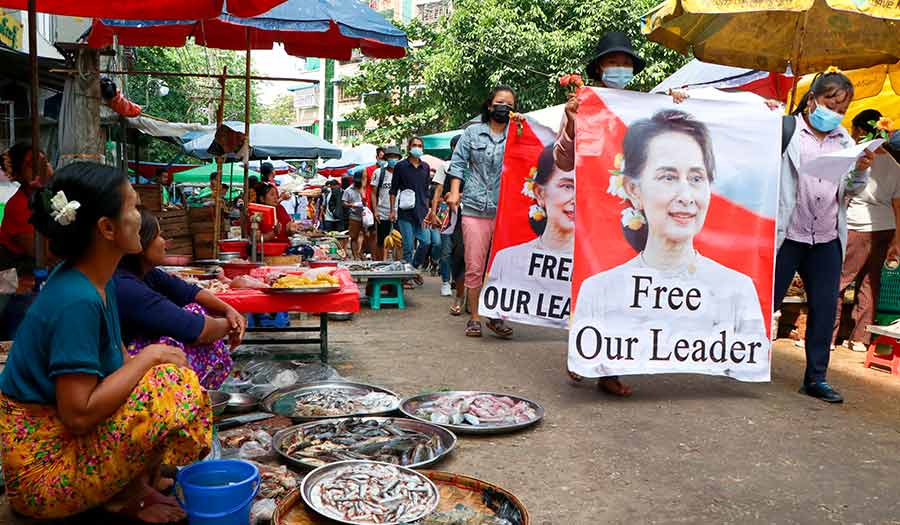 AP Photo
AP Photo
World News Desk
Learn the why behind the headlines.
Subscribe to the Real Truth for FREE news and analysis.
Subscribe NowBANGKOK (AP) – Two years after Myanmar’s generals ousted Aung San Suu Kyi’s elected government, thousands of people have died in civil conflict and many more have been forced from their homes in a dire humanitarian crisis.
Myanmar’s economy, once one of the fastest growing in Southeast Asia, now lags behind where it stood before the February 1, 2021, military takeover compounded the country’s struggles with the pandemic.
Ten years earlier, Myanmar had emerged from decades of military rule, gradually transitioning to a civilian government, opening its economy to more foreign investment and entrepreneurship and relaxing censorship of the media.
A modern consumer culture took hold, with glitzy shopping malls in the biggest city, Yangon, and use of Facebook and cellphones the new normal. The army takeover brought thousands into the streets in peaceful protests that were suppressed with lethal force.
What Happened on Feb. 1, 2021?
The army arrested Ms. Suu Kyi and top members of her governing National League for Democracy party, which had won a landslide victory for a second term in a November 2020 general election. The army said it acted because there had been massive voting fraud, but independent election observers did not find any major irregularities. Senior General Min Aung Hlaing, best known for his role in a 2007 crackdown on pro-democracy protests, now leads the government.
The ouster of the civilian government provoked widespread demonstrations and civil disobedience. As weeks dragged on, security forces crushed shows of opposition with violence. So far, nearly 3,000 civilians have been killed and tens of thousands forced from their homes by fighting between security forces and civilians who took up arms, sometimes allying themselves with ethnic armed groups that have been fighting for autonomy for decades.
The military’s seizure of power drew international condemnation. Many governments have shunned the army-led leadership and imposed sanctions, cutting off some financial flows. But neighboring countries in Southeast Asia and Myanmar’s most powerful ally, China, have balked at taking such actions.
Where Is Aung San Suu Kyi?
Nobel Peace Prize laureate Ms. Suu Kyi, 77, was the de facto head of government, holding the title of state counsellor, when the army arrested her and took power. In December a court sentenced her to seven years in prison for corruption in the last of a string of politically tinged criminal cases against her, leaving her with a total of 33 years to serve in prison.
Ms. Suu Kyi’s supporters and independent analysts say the numerous charges against her and her allies were an attempt to legitimize the military’s seizure of power while eliminating her from politics before an election promised for later this year.
Ms. Suu Kyi, the daughter of Myanmar’s martyred independence hero Gen. Aung San, spent almost 15 years as a political prisoner under house arrest between 1989 and 2010. She is being held in a newly constructed separate building in the prison in the capital, Naypyitaw, near the courthouse where her trial was held.
What Is Life Like Under Military Rule?
Two years after the army seized power, life in Yangon and other big cities has inched back toward normality but fighting in much of the countryside has left the country deeply mired in civil conflict.
Rights advocates say the military and security forces have carried out arbitrary arrests, torture and other abuses to quash dissent. Human rights monitoring groups said Tuesday that Myanmar’s military is increasingly turning to airstrikes with deadly results to try to crush stiff-armed resistance.
While the military is responsible for massive use of violence throughout the country, militants in the opposition have carried out bombings and assassinations of military officials and their supporters. Min Aung Hlaing on Tuesday accused opponents of army rule of trying to take power with “wrongful forcible means.”
The World Bank forecasts the economy will grow a meager 3 percent this year, with some strength in agriculture and industries such as garment making. But it remains smaller than it was in 2019, before the pandemic and then the military takeover.
The military’s return to power has stymied a decade of reforms and left 40 percent of the population living in poverty.
Despite stringent foreign exchange controls and uncertainty over rules and regulations under army rule, some businesses are finding ways to operate by using informal payments and trade channels. The reopening of Myanmar’s trade routes with China also has helped.
But risks have been heightened by security issues due to the civil conflict.
What Lies Ahead?
The way out of the crisis remains unclear. The military-controlled government enacted a law on the registration of political parties that will make it difficult for opposition groups to mount a serious challenge to army-backed candidates in the general election set to take place later this year.
Critics have already said the military-planned election will be neither free nor fair because there is no free media and most of the leaders of Ms. Suu Kyi’s National League for Democracy party have been arrested.
The party has declared it will not accept or recognize the election, which it has described as “fake” and a ploy by the military to gain political legitimacy and international recognition. The vote is also opposed by the National Unity Government, which was established by elected lawmakers who were prevented from taking their seats when the army seized power and serves as an underground parallel national administration.
Units of the People’s Defense Force, the armed wing of the banned pro-democracy movement, have been attempting to disrupt preparations for the election by attacking personnel of the military government who are conducting a population survey that could be used to assemble voter rolls.
- Real Truth Magazine Articles
- MEDIA
 Weathering the Misinformation Age
Weathering the Misinformation Age


